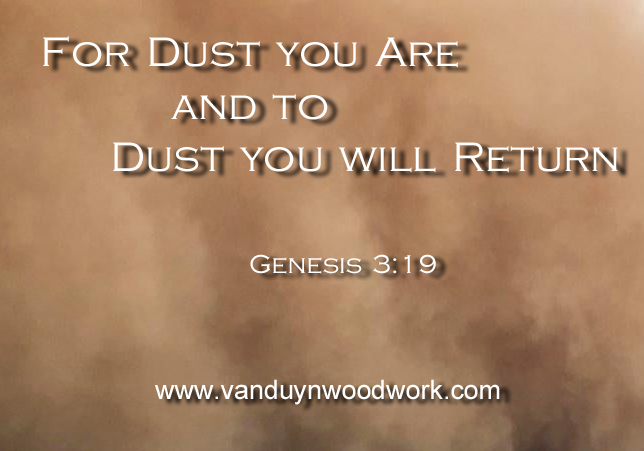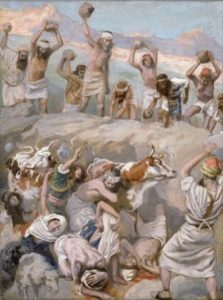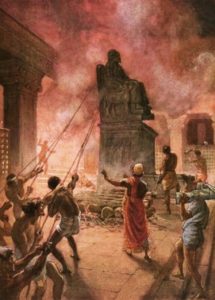
Wondering what does the bible say about cremation? I admit I have been turning custom cremation vessels for many years now and I haven’t been solid on where the bible stands on cremation till now. Seems a bit funny right? This article covers all the verses that I came across regarding cremation and several of the leading concerns about cremation and the bible.
My experience is, not surprisingly, most know very little about cremation until they have to face it. Looks like the same is true for me. So, if your at this point and want to be clear on what the bible says about cremation, this article will be helpful.
As an aside, if you’re now educating yourself on the cremation logistics feel free to take a look at my urn information page after you have read this article. I also invite you to take a look at my cremation vessels found on my cremation urns artistry page.
I looked specifically into verses about ashes, dust, burning, fire, etc… some more relevant to cremation than others. Of the approximately three dozen areas I find no explicit verses in the bible that promote or denounce the act of cremation. Therefor much of what the bible says has some level of interpretation attached to it by man. In case you want some more clout, here is what Billy Graham has to say about it.
What the Bible says about Cremation… I see four categories
First off, I personally do not hold a divinity degree or make my profession in ministry. I am just some guy making really nice wooden cremation urns that dug into the bible for himself. When I’m curious about what the bible says about something, I like to see lots of scripture references.
I am going to show and cite all the verses that I come across, as I prefer to give authority to the Bible rather than myself. Let every matter be established by the testimony of two or three witnesses (2 Cor. 13:1). Working from this premise, I like to evaluate scripture in this way and consider the author of a verse a witness. Therefor, its preferable to have a couple verses in agreement with each other.
Here is a compilation of many of the verses in the bible that talk about ashes or dust. I break them down into four general thoughts or categories.
Removing from History/Desecrating/Purging Evil
2 Kings 23:16
– then Josiah looked around, and when he saw the tombs that were there on the hillside, he had the bones removed from them and burned on the altar to defile it, in accordance with the word of the Lord proclaimed by the man of God who foretold these things.
2 Kings 23:20 – Josiah slaughtered all the priests of those high places on the altars and burned human bones on them. Then he went back to Jerusalem.
Joshua 7:25 – Joshua said, “Why have you brought this trouble on us? (Achan) The Lord will bring trouble on you today.” Then all Israel stoned him, and after they had stoned the rest, they burned them.
Amos 2:1 – “For three sins of Moab, even for four, I will not relent. Because he burned to ashes the bones of Edom’s king,
Couple of thoughts here. There is certainly the purging of evil prescribed in Deuteronomy 13 that is carried out by Josiah in 2 Kings and Joshua in Joshua 7 over Jericho. Amos 2 recalls the account of the Moabite King that is presumed to capture the King of Edom’s son (2 Kings 3:27) and burned him on the city wall either as a burnt offering to Chemosh or revenge, probably both.
Desecrating seems to fall more in line with the burning of bones on the various altars by King Josiah as he purges Judah of all high places, Asherah pole, etc. That desecration may be how evil is purged, not sure.
Another thought I had is burning removes someone form the historical record. Burial is certainly accepted practice among the Hebrews and the bible shows the importance of geneology. Especially in oral cultures, not having a gravestone or Ebenezer effectively removes that person from history. However, there is no verse that talks about this idea specifically.
Cleansing of Impurity
The above verse in Joshua 7 picks up on this concept. The main question, does the bible use burning/fire for the cleansing of impurity? Also is there a negative correlation with cremation and the cleansing of impurity?
Ultimately, based upon the verses in this category, I find it difficult concluding the cremation of the dead is a bad thing. There are some instances of fire being used to remove the wicked from the Hebrew people. However, I contend those instances are on people that are living and not the dead, so its not a one for one.
A quick read of these scriptures can give the impression that burning is a bad thing. That being said, a deeper dive shows that in some cases the people being burned, were not reduced to ash. In some cases, as in Joshua 7, Achan may have been stoned and the plunder burned, so its not completely conclusive.
I wrote a companion article that addresses this category specifically. Its called “Considering Cremation – what the bible says about cremaiton and the cleansing of impurity”. Take a look at the article for specific verses that connect with the idea of purification.
What the bible says about Keeping Ashes
 This is another area that I wrote a companion article. It’s called “What does the bible say about keeping ashes? Is it ok to keep the ashes of your loved ones in your home?“. This category centers around the ashes themselves and whether its ok to keep them. The though posed suggests the ashes or cremains makes one “unclean”. This argument pulls mostly from Leviticus 5:2-5, Number 5:1, and Number 19:9-11.
This is another area that I wrote a companion article. It’s called “What does the bible say about keeping ashes? Is it ok to keep the ashes of your loved ones in your home?“. This category centers around the ashes themselves and whether its ok to keep them. The though posed suggests the ashes or cremains makes one “unclean”. This argument pulls mostly from Leviticus 5:2-5, Number 5:1, and Number 19:9-11.
Ashes making someone unclean is fraught with problems. Namely it seems to take the whole bible out of context and puts cleanliness or legalism ahead of relationship and mercy. As God declares, “I desire mercy, not sacrifice, and acknowledgement of God rather than burnt offerings” (Hosea 6:6). Read the article as it goes more in depth.
Our Ultimate Destination
Ecclesiasties 3:20 – 20 All go to the same place; all come from dust, and to dust all return.
Daniel 12:2 – 2 Multitudes who sleep in the dust of the earth will awake: some to everlasting life, others to shame and everlasting contempt.
Ecclesiasties 12:7 – and the dust returns to the ground it came from, and the spirit returns to God who gave it.
Genesis 3:19 – By the sweat of your brow you will eat your food until you return to the ground, since from it you were taken; for dust you are and to dust you will return.”
The common thread in these verses is “dust”. Logically, the connection with dust and cremation is ashes, and in reality we are all dust at some point. These verses show, the bible does not explicitly promote burial or cremation. It just states what our ultimate destination is.
The verses cited in this article and the two companion articles show what the bible says about cremation. Knowing that, should you cremate? Lets look at the Bible’s take on some questions you may have.
How does the bible answer these questions about cremation?
Does cremation dishonor the body?
I presume this line of questioning pulls from 2 Kings 23 and Amos 2 mentioned above in the desecrating section. One could equate the “bones” in 2 Kings with that of a person being cremated and end up in the same place. They both have bones of deceased people that are being burned.
Josiah, after finding the book of the law, renew the covenant with God and was on a mission to remove all the alters and high places. “He did what was right in the eyes of the Lord…” (2 Kings 22:2) a rarity if you read the accounts of the Hebrew Kings. He was definitely in the minority. The burning as I see it probably did dishonor the pagans and some people, but Josiah was doing what God told him to do (Deuteronomy 13).
So if it comes down to it, should we honor man or honor God? Each of us has to decide that for ourselves. Even considering those verses, God does not say anything that addresses the honor of the body. That seems to be something that man is more concerned with. To that point I think that God is more concerned with the soul than the body.
Mathew 10:28 – 28 Do not be afraid of those who kill the body but cannot kill the soul. Rather, be afraid of the One who can destroy both soul and body in hell.
I have observed working with families that have lost loved ones, cremation and burial is more about the living than the dead. Giving honor to the body of a deceased person has more impact on those that are left. What where the deceased wishes? Does abiding by those wishes help give closure on the events? If it does I think that God may be more concerned about that as I have seen the weight that people sometimes carry for years. To me they can be shackles… and God is definitely concerned about releasing the shackles we carry (Isiah 58:5-11).
Were people in God’s disfavor burned after death?
I came across this question on another website and I suppose they are referring to the passages in 2 Kings 22 and 23 as well as 2 Chronicles 34. I.e. the bones that Josiah had burned. 2 Kings talks about God’s disfavor of the people and said that because Josiah humbled himself he would not see the judgement in his lifetime. That judgement was the exile of the Hebrews to Babylon.
2 Chronicles gets a bit more specific and says that the bones of the idolatrous priests were the ones that were burned on the altars. 2 Kings talks about the asherah being burned and ground to dust then spread over the common graves near by. It is presumable to think that the common people rejected God and followed the pagan gods, see 2 Chronicles 34:4. The priests surely did and their fate was similar in 2 Chronicles 34:5.
So the answer is clear that yes, those people were in God’s disfavor for turning away from God and running to pagan gods. Does this have a connection with cremation? I don’t really see one per say. If anything, I see the Josiah’s account as an act of faith and a message to the living rather than a judgement of the dead. To God, it’s our faith and actions when living that matter, rather than the handling of bodies once passed.
Cremation prevents god from resurrecting a person?
This is a popular question, maybe the most prominent of all concerns about cremation and the bible. From what I can tell the basis of this question comes from a pretty literalistic position on…
1 Corinthians 15:35-49 – 5 But someone will ask, “How are the dead raised? With what kind of body will they come?” 36 How foolish! What you sow does not come to life unless it dies. 37 When you sow, you do not plant the body that will be, but just a seed, perhaps of wheat or of something else. 38 But God gives it a body as he has determined, and to each kind of seed he gives its own body. 39 Not all flesh is the same: People have one kind of flesh, animals have another, birds another and fish another. 40 There are also heavenly bodies and there are earthly bodies; but the splendor of the heavenly bodies is one kind, and the splendor of the earthly bodies is another. 41 The sun has one kind of splendor, the moon another and the stars another; and star differs from star in splendor. 42 So will it be with the resurrection of the dead. The body that is sown is perishable, it is raised imperishable; 43 it is sown in dishonor, it is raised in glory; it is sown in weakness, it is raised in power; 44 it is sown a natural body, it is raised a spiritual body. If there is a natural body, there is also a spiritual body. 45 So it is written: “The first man Adam became a living being”f]; the last Adam, a life-giving spirit. 46 The spiritual did not come first, but the natural, and after that the spiritual. 47 The first man was of the dust of the earth; the second man is of heaven. 48 As was the earthly man, so are those who are of the earth; and as is the heavenly man, so also are those who are of heaven. 49 And just as we have borne the image of the earthly man,so shall weg] bear the image of the heavenly man.
In short the body has to be buried in the ground like a seed so that it can be resurrected. Its one thing to have a preference for burial, after all Jesus himself was buried, although that may be because it was foretold. This is possibly the case in Isaiah 53, specifically verse 9 where much of Jesus’s fate is foretold. Its another case to take this verse (1 Cor. 15:15-39) and build a foundation where someone will not receive their resurrected body because said body was not placed in the ground. To me its difficult to interpret this passage as much of it seems metaphorical. That point of view also seems to put more emphasis on what is done with the physical body rather than the faith one has through the spirit.
That aside, this argument has problems as well. For example, lets say you had a relative that passed in the twin towers on 9/11, or were lost at sea, or some other instance where it is impossible to bury a body. That suggests that God’s hands are tied and does not have the power to resurrect those people with a new body. Aren’t all things possible with God (Mathew 19:26)? Additionally, we all know that bodies, which are buried, turn to dust at some point, even the bones. I would site a source here but a really good authoritative link is tough to find. Generally though, bodies decompose fairly quickly and bones will be left for some period of time.
The time it takes for bones to turn to dust varies on environmental conditions. The process is much quicker when there is more oxygen and humidity. Thus arid climates and bodies being buried deeper in the ground cause the process to slow down. So the order of magnitude could vary from tens of years to thousands. Given the age of humanity and the frequency in which ancient human bones are discovered it suggests that there are more bones turned to dust than remain intact. So are all those people that believed in the resurrection out of luck because their bones didn’t survive?
How likely is it that all the prophets of the old testament had their remains survive intact? What if all of Adam’s bones have turned to dust, would he be resurrected? Could you make the case that Isaiah, for example, wouldn’t be resurrected if his remains were no longer intact? Also how much bone does God need to make a resurrected body? What the bible does say is that he formed man from the dust (Genesis 2:7) so God is shown to have the ability to form new bodies from ash or dust.
Is burial best?
This question seems to piggy back on the concerns of burial versus cremation. Personally, I take objection to the crowd that suggest that burial is “best”. I have seen assertions similar to that of the Vatican “…that burial is the most fitting way to express faith and hope in the resurection.” No where the bible declares one better than another, just that we will return to dust and that we were made from dust (see above). If burial was that important, I suspect God would have made it clear? To suppose a best practice puts a hindrance on the loved ones remaining. To me conducting ones daily life according to Christs example expresses way more faith and hope in the resurrection than being buried in the ground.
There is also the case made that, if cremated, a priority be made to place the ashes in the ground. Spreading of ashes at sea, for example, prevents the ashes to be returned to the ground. These thoughts are also pulling from the Corinthians verse above. Eventually don’t the ashes spread at sea make it to the sea floor and isn’t that part of the earth as well? The same is true for ashes that are stored in urns, don’t they eventually make it back to the earth if you wanted to take a literalistic point of view?



